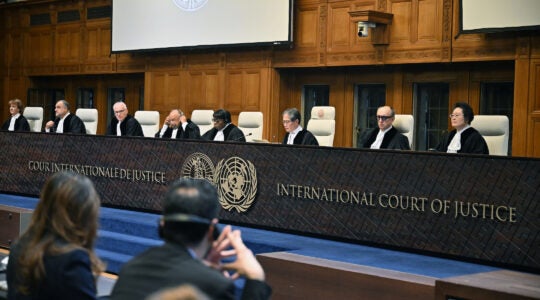NEWS ANALYSIS
JERUSALEM (JTA) — Despite its hard-line Knesset slate and the presence on the ticket of extremist Moshe Feiglin, Benjamin Netanyahu’s Likud Party still leads in the polls to win Israel’s election in February.
So far, it seems that the inclusion of Feiglin, who has advocated transferring Israeli Arab citizens to Arab states, has not hurt Likud nearly as much as Netanyahu feared. But with nearly two months left until Election Day, the question is whether Likud could be tarred with an extremist hue that would drive away centrist voters and deter potential centrist coalition partners.
To avoid alienating centrists and solidify his position as front-runner in the Feb. 10 race, Netanyahu had hoped Likud members would choose a far less hawkish list in the Dec. 8 primary. But party voters elected at least seven hawkish ideologues, six figures who opposed Ariel Sharon’s 2005 disengagement plan from Gaza and six members allied with Feiglin.
That means that about half the Likud Knesset faction is likely to oppose any peace moves Netanyahu may seek if he becomes prime minister.
What makes the list even more problematic for Netanyahu is the high-profile presence of Feiglin, who holds some radical anti-democratic views. The Jewish Leadership movement he heads advocates an authoritarian theocracy, expulsion of Palestinians and non-recognition of Israel’s Supreme Court. In short, it rejects Israel’s secular democracy.
To marginalize the Feiglin factor, Netanyahu challenged the results of the primary. He argued that, according to party rules, the candidates elected on the various district lists should have been placed higher.
The Likud court upheld his appeal, pushing Feiglin down the list from the safe 20th spot to the borderline 36th. That means that if Likud wins 35 or fewer seats, Feiglin is out. Feiglin says he won’t appeal the decision because he does not recognize the Supreme Court, which he derided as “a branch of Meretz,” the left-wing party.
Polls taken after last week’s Likud primary show the party still well ahead of Tzipi Livni’s Kadima, with Labor a distant third. The mid-December polls give Likud 31 to 36 seats, Kadima 20 to 28, and Labor 11 to 15 in the 120-seat parliament. More significantly, the polls all give a Likud-led right wing-religious bloc a majority over a center-left coalition, boosting Netanyahu’s chances of becoming Israel’s next prime minister.
The Likud comeback from just 12 seats in the current Knesset to its anticipated showing in February is unprecedented in Israeli politics.
Several factors made it possible: The 2005 disengagement from Gaza, Kadima’s raison d’etre, generally has been perceived as a failure because of the enusing rocket attacks on southern Israel; the Kadima-led government was discredited by its poor handling of the 2006 Lebanon war; and Netanyahu, with his strong economic background and despite his free-market orientation, is seen as the best person to deal with the impact on Israel of the global economic crisis.
Likud also has been helped in its revival by the relative weakness of Netanyahu’s rivals. Labor chief Ehud Barak is widely disliked because of his perceived arrogance and poor interpersonal relations. And the failure by Kadima’s Livni to form a new coalition government following the resignation of Prime Minister Ehud Olmert raised questions about her ability to handle Israel’s top job.
Should Likud win 35 seats, it would mean a gain of apporoximately 800,000 new supporters — some 20 percent of the electorate. Most of them, pundits say, are Likudniks returning to the party after leaving to vote for Kadima or traditional blue-collar Likud supporters who stayed home last election to protest Netanyahu’s welfare cuts.
Likud’s rivals in Kadima are attacking Netanyahu’s character, saying he panics in a crisis, tends to distort the truth and is not reliable. Labor is emphasizing Netanyahu’s capitalist orientation, blaming him for losses to the pension fund that the government is being asked to underwrite.
Both argue that under Netanyahu, a head-on clash with the Obama administration in the United States over peacemaking is almost inevitable — especially given Feiglin’s role in the party.
Feiglin rejects the notion that his presence on the list or its hard-line character will cost votes for Likud.
“One-third of the electorate defines itself as right of the Likud,” Feiglin told JTA. “And if the Likud can open a door for them by putting people on its list who represent the national camp, its share of the vote will actually grow.”
Feiglin’s influence in Likud is considerable. His large camp of Jewish Leadership supporters, estimated at 6,000 to 7,000, was able to push hard-line candidates up the list and relegate moderates such as former Foreign Minister Silvan Shalom and ex-Justice and Finance Minister Dan Meridor to the bottom. Shalom, nominally the No. 2 man in the party hierarchy with a large camp of his own, finished a disappointing seventh. Meridor came in 17th.
The showdown with Feiglin after the primary constituted something of a victory for Netanyahu. By showing revulsion for Feiglin and what he stands for, Netanyahu made the Likud list potentially more attractive to centrist voters and paved the way for possible coalition moves with Kadima and Labor.
During his term as prime minister from 1996 to 1999, Netanyahu was forced to navigate between U.S. pressure for land concessions to the Palestinians and hard-line opposition in his coalition to any territorial compromise.
His zigzagging cost him his credibility and eventually brought him down. Netanyahu says his big mistake was going for a coalition with the far right rather than a national unity government with Labor.
This time, if elected, he hopes to offset right-wing pressure through a coalition with Kadima and Labor. That could give him enough votes around the Cabinet table and in the Knesset to cooperate with new U.S. or international peacemaking initiatives.
JTA has documented Jewish history in real-time for over a century. Keep our journalism strong by joining us in supporting independent, award-winning reporting.





